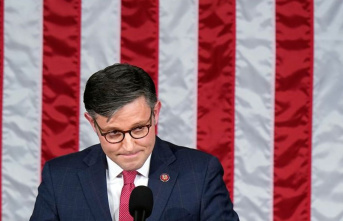Brexit, an own goal? Three years after Britain left the EU, a majority of the crisis-stricken British population thinks the move was a mistake, polls show. For the governing Brexit supporters, the pressure is therefore greater than ever to finally deliver tangible benefits. A controversial project aims to break free of all the shackles left over from the old days - the "EU Regulations Fireworks" mission.
Put simply, the planned law says: What has its roots in the EU must go - the content is irrelevant. A clause, originally called the "Sunset Clause," ensures that with a few exceptions, such as for the financial sector, all laws from EU times should automatically expire at the end of the year.
When asked whether the project was ideologically driven, legal expert Joelle Grogan from the think tank UK in a Changing Europe didn't hesitate for a second: "Almost exclusively," is her verdict.
The list of possible consequences is long
At first glance, the UK-native otter may have little in common with the standard working hours of white-collar workers and the quality of poultry. But London is making it possible for their protection to be threatened by the same scheme - the so-called Retained EU Law Bill, which has already cleared its first hurdle in the House of Commons.
A government database has identified 2,400 laws that were simply copied from EU law into UK law after Brexit. Media reports assume that there could be thousands more. "It's really amazing that laws should expire that we don't even know what they are," says lawyer Grogan in an interview with the German Press Agency.
While non-Brexit supporters also welcome targeted reforms of the adopted laws, the course taken is causing a stir. "The only certainty in this law is insecurity," Grogan said. The list of actors who have expressed objections in writing is long: it ranges from environmental organizations to creative people, business associations, management consultancies to the Facebook group Meta.
What they fear is serious: unregulated chemicals could end up in food or agriculture, musicians could have problems with copyrights, endangered native species such as otters or dolphins would become extinct, employees would be at the mercy of their employers without any protection, or safety on construction sites, on planes, in the... Internet or the energy supply suffer - and that is just a small selection of the possible consequences.
Deregulation is a low priority for companies
For the Tories, it's primarily about using the promised "Brexit freedoms". Prime Minister Rishi Sunak, who shredded rows and rows of EU legislation in an election campaign video, is under enormous pressure from his party's arch-conservative Brexiteers. "Brexiteeers should be concerned that after a silver bullet has been promised, the law will only miss fire," writes political expert Jill Rutter of the think tank Institute for Government in a guest article in the "Financial Times". But Sunak wants to stick to the law introduced by his predecessors and recently called for a "joint effort". In order to prevent chaos, EU laws would have to be reviewed and reformed in all ministries, which is considered impossible with the available resources.
Even the British economy does not seem to be longing for the EU regulations to end as quickly as possible: In a survey by the British Chambers of Commerce association, around half of around 940 companies surveyed said that deregulation was not a priority or only a low priority for them. "Companies didn't demand this law," says William Bain, who is responsible for trade policy at the association. "You're not asking for fireworks of regulations just for the sake of fireworks." Excessive deviations from EU rules could make trade even more difficult.
Grogan also sees this danger: If all kinds of laws were to expire, it is likely that Great Britain would violate the Brexit trade agreement with the EU, since the requirements for equal competitive conditions are no longer given.
Resistance in the House of Lords is expected
Next, the bill must clear the next hurdle in the House of Lords, where significant opposition is expected. "The Lords will be critical," Grogan is certain. Should the law ultimately pass in a weakened form, it could even mean a face-saving solution for Sunak's government, some experts believe.
Few benefit from the "fireworks" outside of Tory circles. "It's only slightly less stupid than passing legislation that says Britain should have a colony on Mars by the end of 2023," comments the Financial Times. "And that would at least have the advantage of being ambitious and providing funds for the British space industry."











